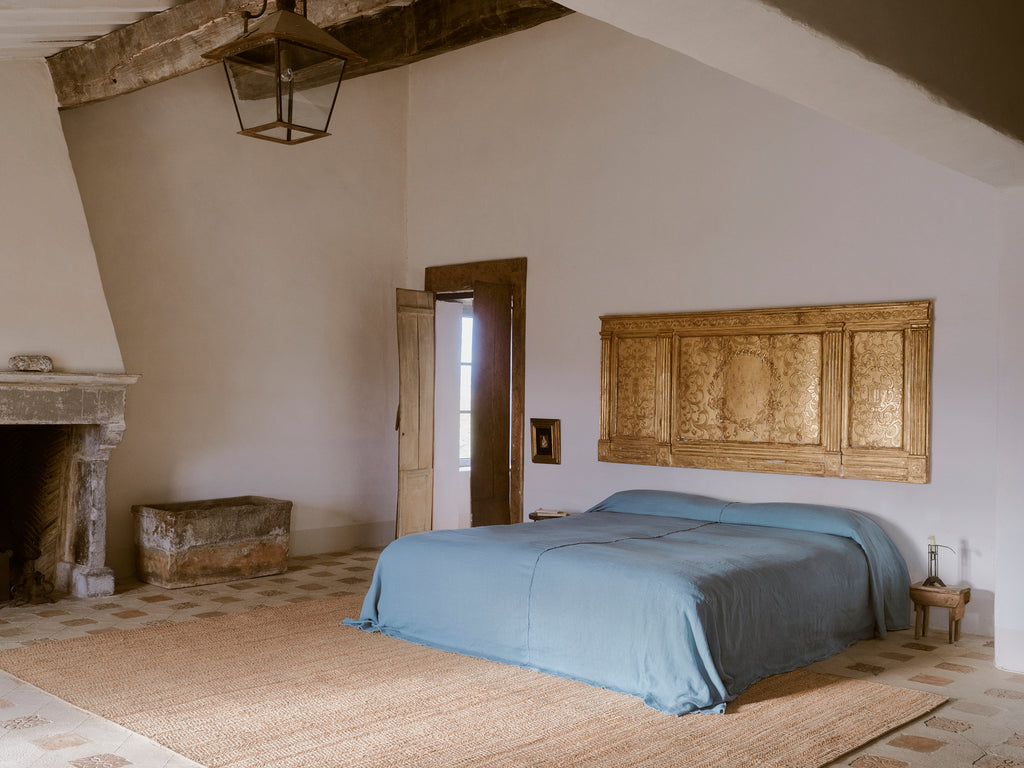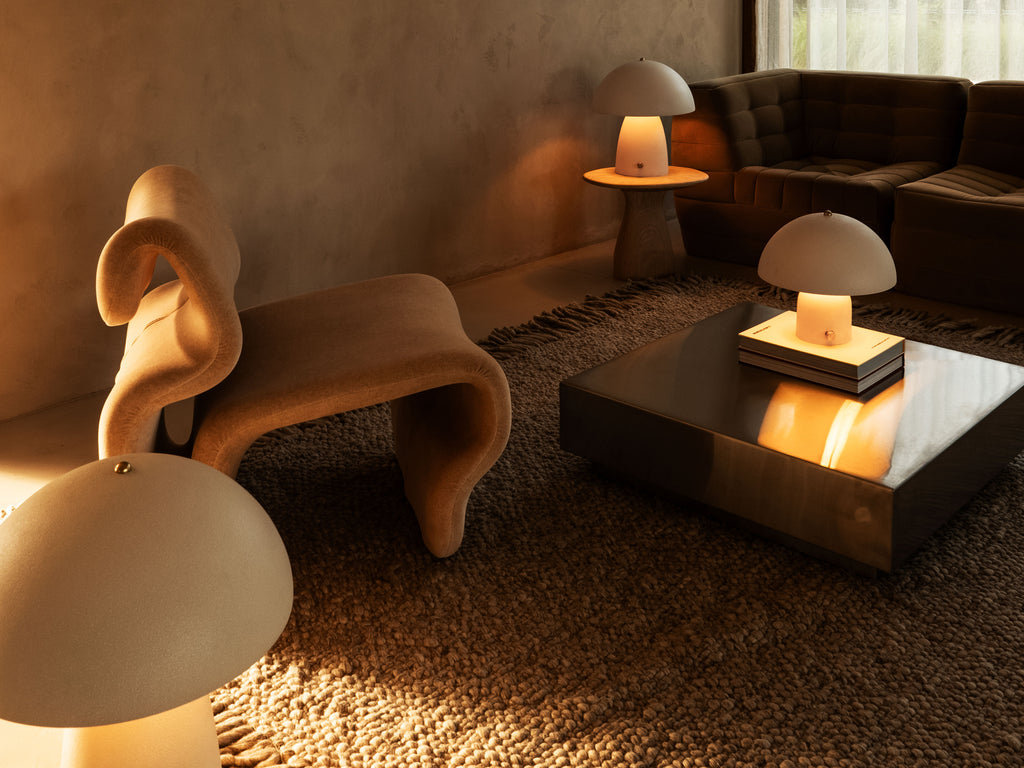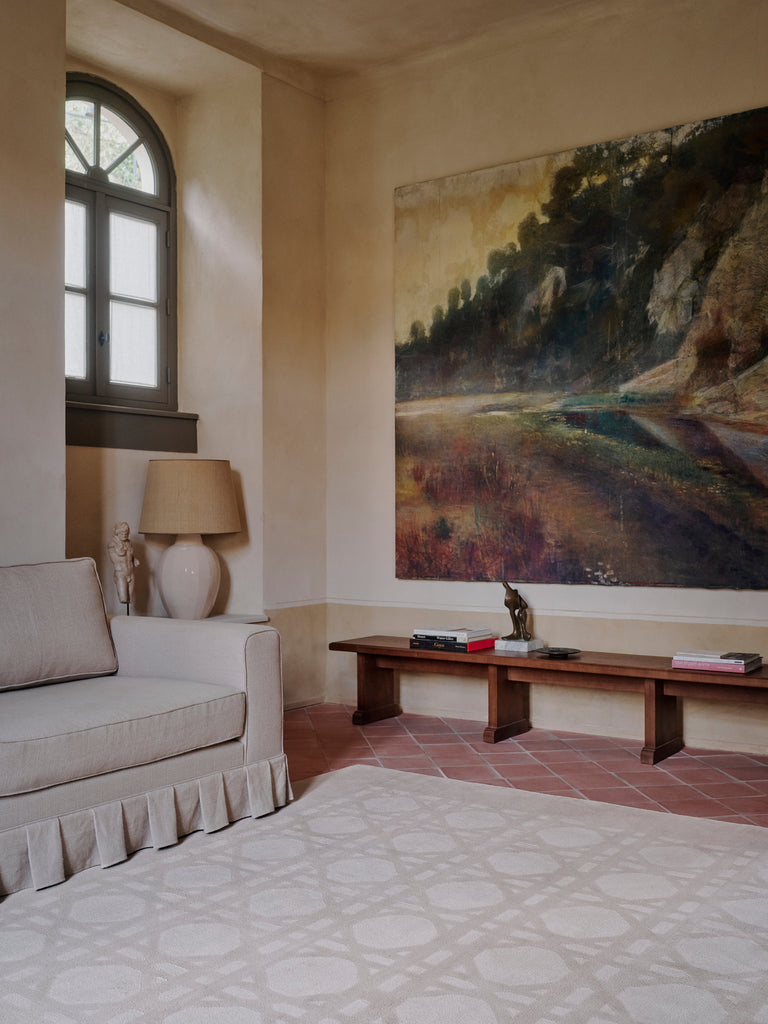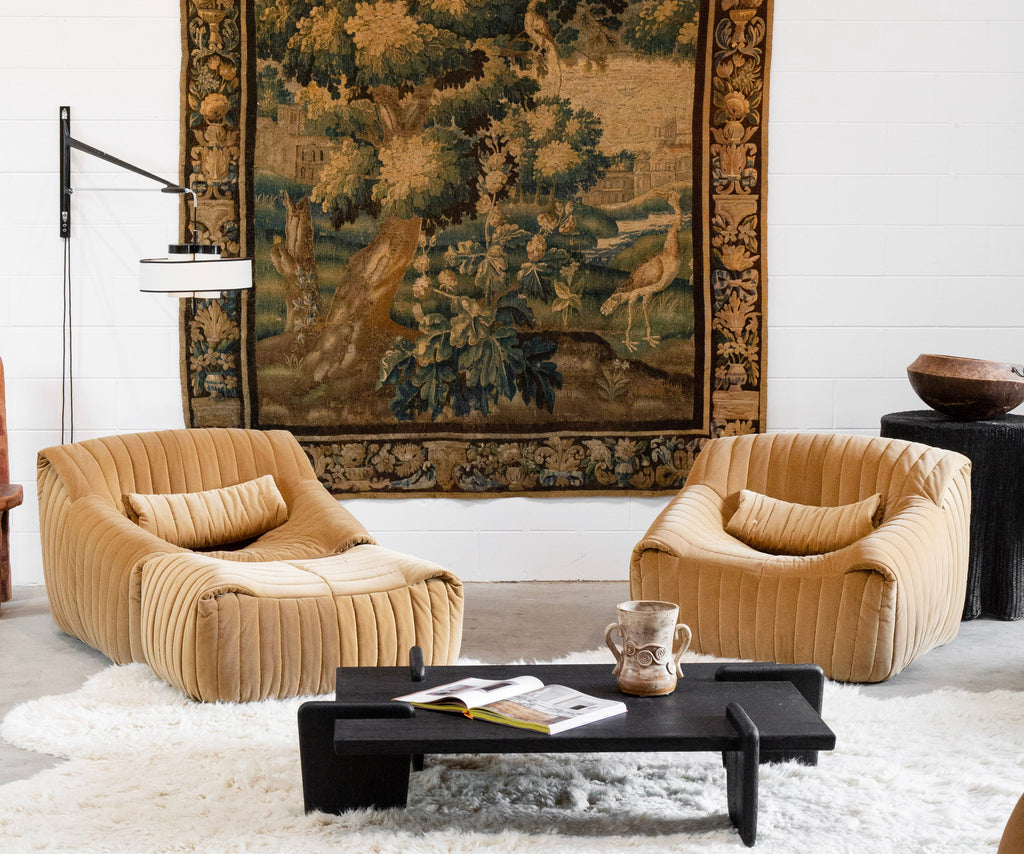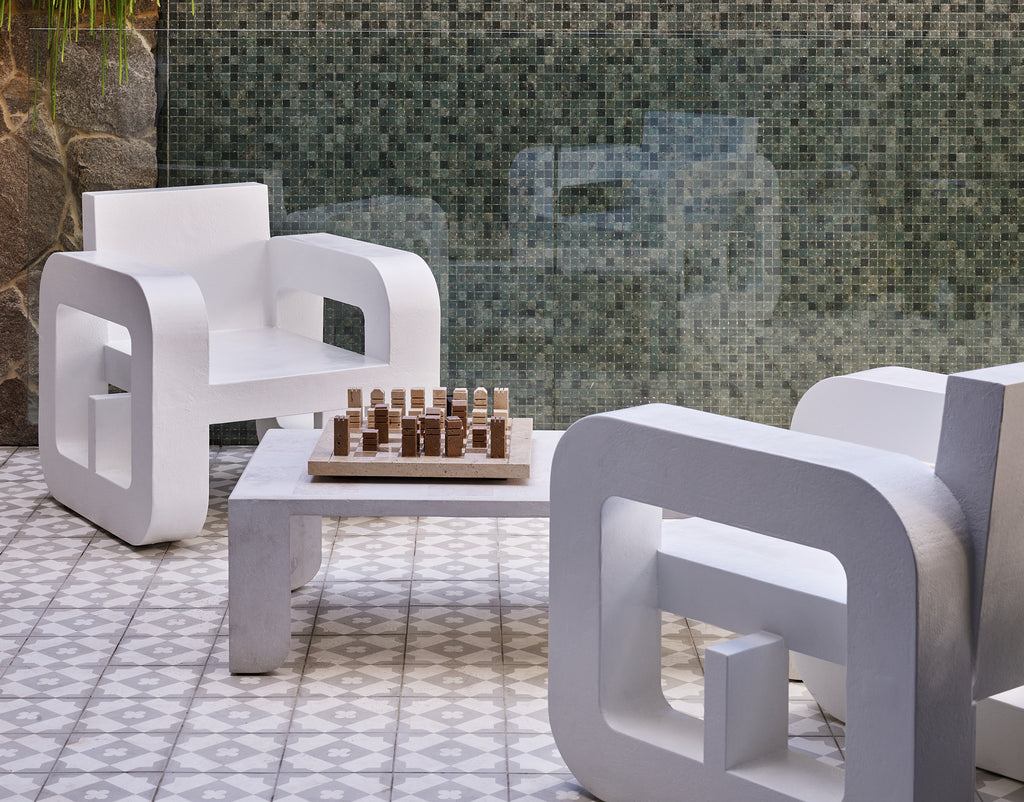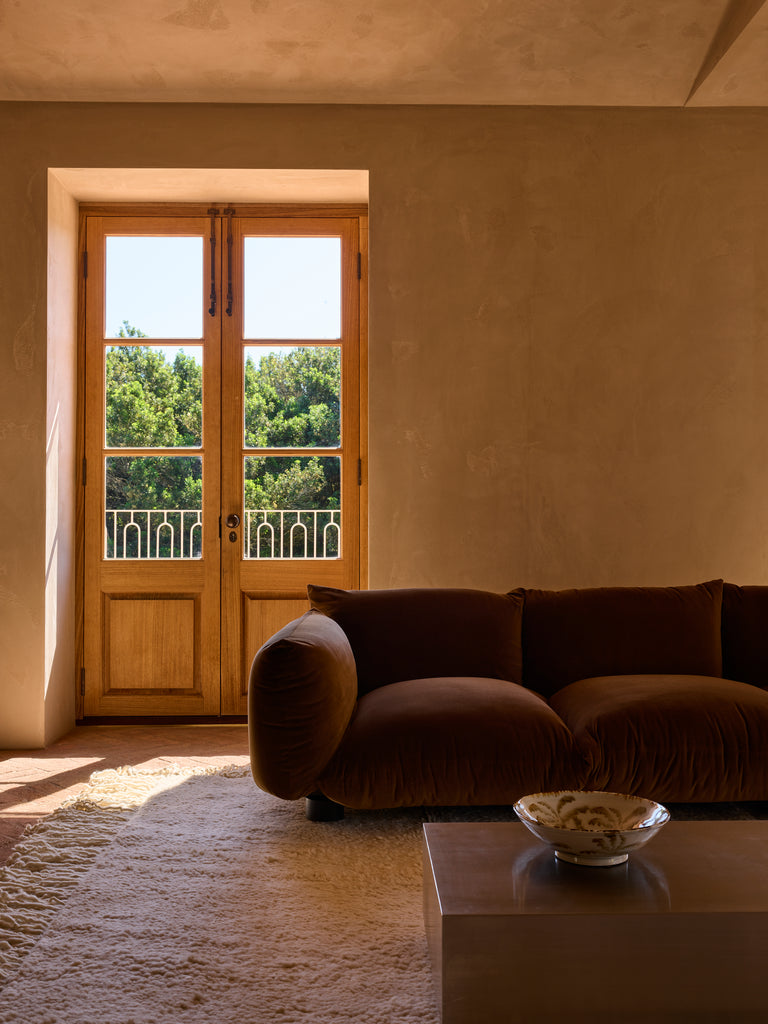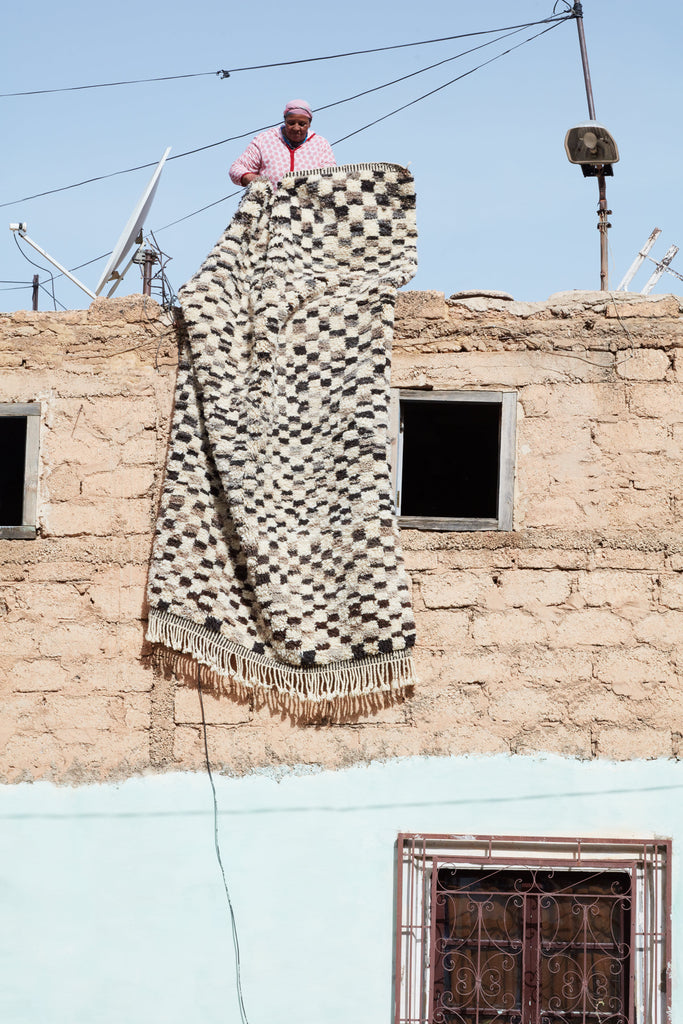
COMMON THREAD
Using art to uphold the time honoured skills of the female weaver, One Square Meter at a time…..
“Buried deep within the fibres of wool that twist and turn coming together to form the body of the rug, is a story, a reflection of collective dreams. It is a mirror that defines the imagination of the woman who is its weaver, a mirror of the established collective knowledge of those whose voices are carried forth with each knot, and a mirror of the land, the earth, that has gifted its people with ‘Baraka,’ the divine blessing, that is wool.”

On one of our many trips to Morocco, we had the honour of travelling with our good friend Nina to a womens weaving cooperative based in the Atlas Mountains to meet with some of the women and hear their stories. It was both rewarding and also profoundly sad to hear of their hardships and struggles to pay for simple needs. While we were there, one of the women had issues with her prosthetic leg which was playing up and badly needed updating. Going to the doctor was a luxury not available to her on her salary. Many of the women came to the cooperative to weave simply as a chance to connect and talk - with no real financial gain. On this occasion we were able to assist her in receiving a new leg. Unfortunately - this is a struggle for many women weavers, who are the traditional custodians of this highly skilled craft. We are incredibly proud of the work that Nina and Mina are doing to raise awareness for the weavers and give them a voice to tell their story through their organisation One Square Meter. We are sharing it with you on International Womens Day in the hope that better understanding and consciousness will improve the lives for the weavers, their families and villages, while ensuring the hand-weaving tradition, and the skills passed down through generations, remain alive for the future.


Traditionally, women are the artists behind the Moroccan carpet, one of the country’s most lucrative exports. The weaving traditions passed down through centuries are now threatened as the upcoming generation of women, are no longer interested in continuing in the footsteps of their mothers, instead leaving the villages for more lucrative careers.
Highly skilled, the sacred Berber traditions date back thousands of years. Each one is rich with symbolism and stories that have become functional pieces of artwork, as well as cultural and historical treasures. These traditions have been carried on by the Berber women who are the main weavers behind the craft but today, they’re in danger of being lost.


Growing up watching their mothers work for below minimum wage, the daughters of the Berber women saw that carrying on the craft wasn’t worth the immense effort. What would’ve otherwise been the new generation of female weavers, are now leaving for places like Dubai to pursue beauty therapy and Spain to go fruit picking. Many of the upcoming female generation have said they’d be interested in pursuing the craft if work conditions change. As social media has caused the rug industry to expand, the situation of the female weavers have remained stagnant, while the wealth of producers and bazaar owners has grown significantly.

Weaving change into the rug industry
Having worked as a designer in the carpet industry for over 8 years, Nina Mohammad-Galbert would constantly speak with the weavers about the issues they faced and decided to step in. Launching her organisation One Square Meter along with Mina Abouzahra, her aim is to offer the financial recognition these female weavers deserve and consequently preserving these valuable traditions.


Staging a collaboration with famous international Dutch designers and female weavers, One Square Meter’s central strategy was to use the prominence of these European designers to raise awareness about each weaver’s story. Collaborating with five designers who specialise in the realm of textiles including Mattijs van Bergen and Wieki Somers, they encourage the female artisans to weave their stories into each design. While this is traditionally what they always did, today they’re mostly given designs to work from, dictated by marketability. “Many of the women felt intimidated when we initially proposed that they approach their 'One Square Meter' as an outlet for self expression, but after spending time with the artists and understanding the importance of self expression they felt more self assured,” Nina said of the recent collaboration. “The experience of spending 5 days living, eating and working with the women was a profound one. Our Dutch artists not only learned how to knot a carpet, but they were able to connect on an emotional level with the woman.”


Creating sustainable futures
Additionally, the project raises more awareness through collaborating with a museum to put on exhibitions, along with participating in several international fairs including Dutch Design Week 2020. “Our hope is by building public awareness through art, more people (especially Westerners) will make more conscious decisions when purchasing handmade rugs made in Morocco,” shares Nina. “This is the first step. The women weavers (both those who work at home and in cooperatives) are islands and have no real access to free and fair trade. They pretty much rely on middlemen to sell their products. If we can help the cooperatives by bringing attention to their needs and slowly helping them access more profitable and sustainable means to sell their products, we’re on the path to creating a better, more inclusive system that will lead to better pay.”
Nina intends to work long term on the project, so that it is sustainable long after completion. After the exhibits, she’ll create an open platform business plan to help the women build their own long-standing businesses. “I’d say that there are two major hindrances to the women becoming independent and more connected to the larger international marketplace; one is language and the second is a state of mind,” Nina explains. “As part of our business plan for the cooperatives, we aim to incorporate language classes into the objectives as well as instruction by mentors who can educate the women on the advantages of incorporating current technologies such as social media and website as viable ways to overcome limitations set forth by the supply chain that exists today. We’ll provide assistance to them in the creation of these platforms.”


Watch: Weavers by Carvane Earth (featuring Nina Mohammed-Galbert)
ARTISAN_MOROCCO from Caravane Earth on Vimeo.


